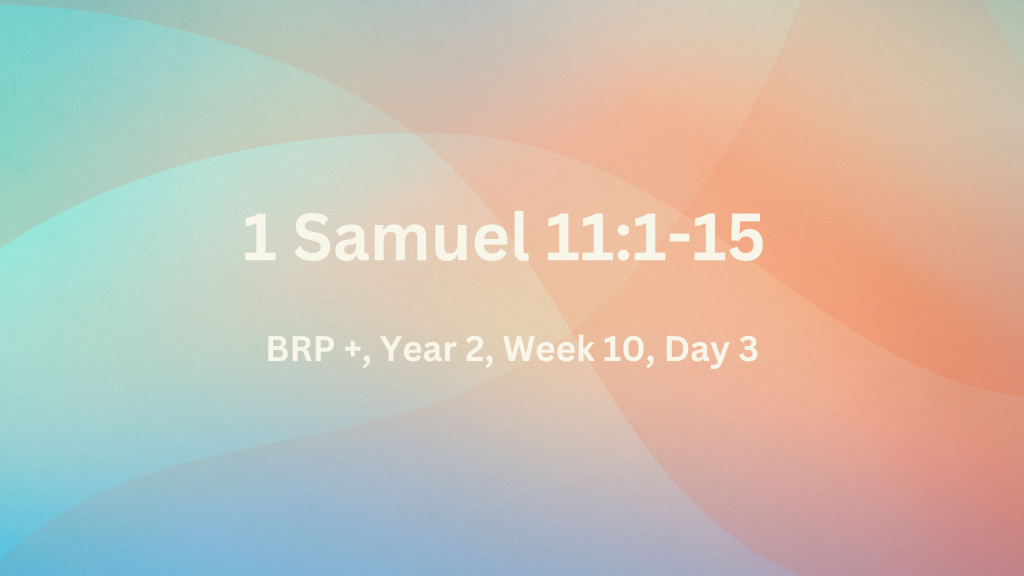1 Samuel 11:1-15
Q.1. What prompted Nahash the Ammonite to attack Jabesh-gilead? How did the people respond? What condition did Nahash want to impose? How did the elders of Jabesh react to the threat? – (1 Sam.11:1-4)
The story of Jephthah in defeating the Ammonites gave us clear evidence of the constant antipathy between the Ammonites and Israel c.f. Jdgs.11:12-28). This story explained how the people of Israel had avoided conflicts with the nations but were given no alternative by the hostile actions of these people, so – The Lord, the God of Israel, gave Sihon and all his people into the hand of Israel, and they defeated them; so Israel possessed all the land of the Amorites, the inhabitants of that country (Jdgs.11:21). Jabesh in Gilead was located east of the Jordan, in the tribal area of Manasseh. It was still in a weakened position after the reprisals following the civil war some 90 years earlier (Jdgs.21:8-12). Consequently, Nahash was trying to ‘reclaim’ what he considered was Ammonite land. The people of Jabesh-gilead saw that they had no choice, but to enter into a covenant with Nahash (1 Sam.11:1). This would not satisfy Nahash. who told them – … I will make it with you on this condition, that I will gouge out the right eye of every one of you, thus I will make it a reproach on all Israel (1 Sam.11:2). The elders pleaded for a time of seven days to see if anyone in Israel would rescue them (1 Sam.11:4). The people were devastated.
Q.2. How did Saul respond to the news? Why? What did his initiative do to galvanize the sons of Israel? What did he promise the city of Jabesh-gilead? What message did they pass on to Nahash? – (1 Sam.11:5-10)
Saul was ploughing with some oxen. When he heard the report of the people weeping – The Spirit of God came upon Saul mightily when he heard these words, and he became very angry (1 Sam.11:6). As the Levite did in the time of the Judges, Saul – took a yoke of oxen and cut them in pieces and sent them throughout the territory of Israel by the hand of messengers, saying, “Whoever does not come out after Saul and after Samuel, so shall it be done to his oxen.” Then the dread of the Lord fell on the people, and they came out as one man (1 Sam.11:7 c.f. Jdgs.19:29; 20:4-6). Soon Saul had amassed an army of three hundred thousand from Israel and thirty thousand from Judah. Saul then sent the messengers from Jabesh-gilead home with the promise – … Tomorrow, by the time the sun is hot, you will have deliverance … (1 Sa.11:9). The men from Jabesh-gilead in turn relayed a message to Nahash – … Tomorrow we will come out to you, and you may do to us whatever seems good to you (1 Sam.11:10).
Q.3. What strategy did Saul use against the enemy? How did the battle go? What did they want to do to Saul’s detractors? How did Saul respond? Who directed the coronation of Saul to be king? – (1 Sam.11:11-15)
Saul then divided the army into three companies. They made a surprise attack at dawn, and completely routed the Ammonite army (1 Sam.11:11). The Israelite army was in the mood for more bloodshed – the people said to Samuel, “Who is he that said, `Shall Saul reign over us?’ Bring the men, that we may put them to death.” (1 Sam.11:12). However, the young Saul showed real wisdom and declared that there would be no retribution on his account. He acknowledged that it was God Who had helped them prevail (1 Sam.11:13 c.f. 1 Sam.15:17). Samuel then gathered the army and urged them – … Come and let us go to Gilgal and renew the kingdom there (1 Sa.11:14). This they did – … and there they made Saul king before the Lord in Gilgal. There they also offered sacrifices of peace offerings before the Lord; and there Saul and all the men of Israel rejoiced greatly (1 Sam.11:15). It was a promising beginning.

